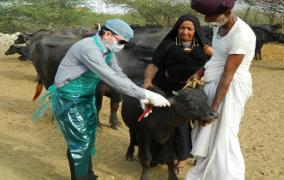LIVELIHOOD

In a situation where crops were seasonal, literacy skills insufficient, and habitations remote, poverty and marginalization became the main features of oneÔÇÖs lives. To enhance their livelihoods, the communities in the Kutch District of Gujarat turned to dairy farming for securing a regular income. The incomes did become more regular, but profits gained was not much, as animal maintenance and veterinary services were not only expensive, but also unavailable many times. The sporadic veterinary services resulted in low productivity, and at times even death of the animals. Also, obsolete feeding and animal healthcare practices lowered profit margin and increased production cost.
With an objective to improve the management practices of small and marginal dairy owners, CARE in collaboration with a local implementing partner identified the most backward and least developed blocks in Kutch district. Realizing the importance of extending comprehensive and basic health services as a first step towards increasing profits, CARE consulted communities and relevant stakeholders. It was found that lack of adequate veterinary personnel and huge distance between each village were the biggest roadblocks.
To bridge this gap between demand and service, CARE and the Government Veterinary Department of this district introduced the ÔÇÿCommunity Veterinarian ModelÔÇÖ. As per this model, training on basic and emergency animal health care services was provided to local youths.
Community Veterinarian Model works towards providing a variety of animal healthcare services at the doorstep of the clients. The trained group of volunteers provide counselling and advise on herd improvement services like artificial insemination, feeding and fodder management practices, treatment and early prognosis services. To help the dairy owner buy feeds at lower market prices, cattle feed centers at strategic locations have been established. CARE works with the communities to help them move out of primitive milk collection model towards a comprehensive livestock promotion mode.
The services provided by the community veterinarians are offered at fair and competitive charges. More importantly, the charges are fixed by the users of their services. Currently ten community veterinarians are offering their services to 185 villages, and they are assisted and mentored by six others. Now, the local community has access to dependable and high quality veterinary care round the clock.
The success of community veterinarian model can be gauged by the fact that now even the Government Veterinary Department is seeking the help of these veterinarians, especially in matters of surgery and delivery related cases. Lowering the expenses has led to an increase in profits, which has been instrumental in helping families invest in business expansion.
Devabalan and Arun Kumar Tiwari
K-Leap project
Kutch District, Gujarat




